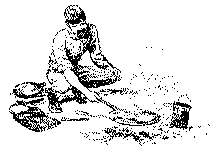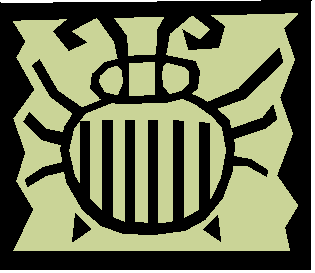

|
|
One of the most laughable incidents that the writer remembers in
connection with the memorable siege of Chattanooga, occurred one day,
while the Confederates were shelling us from the mountain. We had been
having it pretty hot, which brought us to our pits for safety, when we
seized the occasion of a momentary lull to procure some hot coffee. A
negro cook of one of the officers was busy preparing some in an
old-fashioned coffee-pot, when the Confederates, having got the range
of our little group, began to drop something among us harder than ripe
gooseberries. Sambo began to get very nervous. He said: "It am berry
warm heah, massa; I specks a little way back better." But a stern "Go
on with your duty" was the only answer he got. Suddenly a piece of a
shell came whizzing along, and struck the coffee-pot, smashing it, and
almost blinding the negro with the scalding hot liquid. With a yell of
fright and pain, he started off like a deer, heedless of where he was
running to. As luck would have it, a fussy, pompous, portly Captain of
a Regiment near by us, was approaching us to order us to our
rifle-pits, so as to induce the enemy to cease firing. He did not see
Sambo, neither did Sambo see him. With head down and arms extended, the
terror-stricken darkey butted the pursy officer squarely in the stomach
with the force of a battering ram, bowling him over like a tenpin, and
rolled over him. Poor Sambo was set upon by the irate Captain, and
thinking one of the rebels had got him, kept bellowing out for help,
while he returned the Captain's kicks and cuffs with interest. We
managed to get the darkey away, but the Captain believed it was a
put-up job of the boys. |

|
There was not an hour in which a portion of the Army was not under fire from the enemy. The continuous roar of musketry and boom of cannon, far and near, became so monotonous to us that they no longer attracted our attention, unless they came to our immediate front, and we became engaged. We cooked our meals and ate them, wrote letters to loved ones at home, washed and mended our clothing, hunted for "graybacks" and found them along the seams of our shirts, polished our guns, built breastworks and slept under this ceaseless "zip" of the bullet and "screech" of the shell. |
|
After this, the Union and Confederate lines of intrenchment became very near each other. In some places, they were not over thirty yards apart. The lines of our Brigade were so close to the enemy, that no one on either side could show his head above the works without getting shot. For a little diversion we would sometimes put our cap or hat on a bayonet, and hold it above the works, when it would be pierced by a bullet in an instant. We could advance only by night. |
|
The following poem the writer of this history found on the dead body of
a Confederate soldier killed in this battle, who, doubtless, was its
author, whose cheerful life went out in darkness, no doubt "fighting
bravely" by "Fate's decree:" |
|
|
||
| previous page |
|
next page |
|
|
||